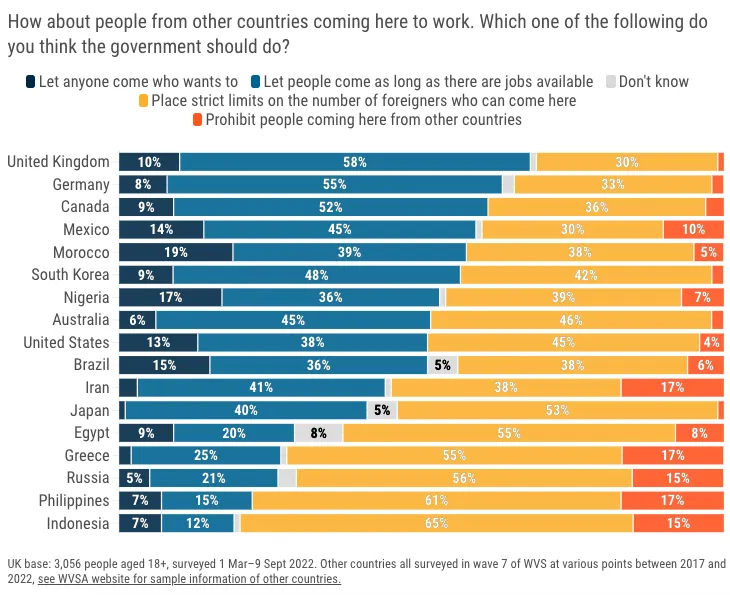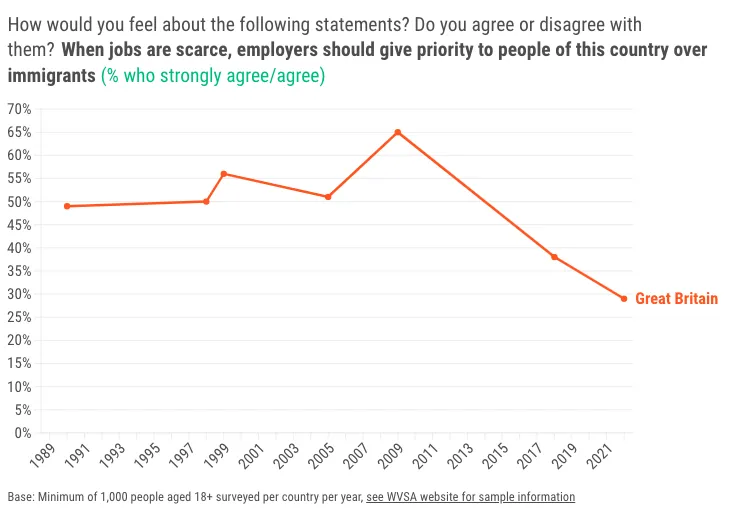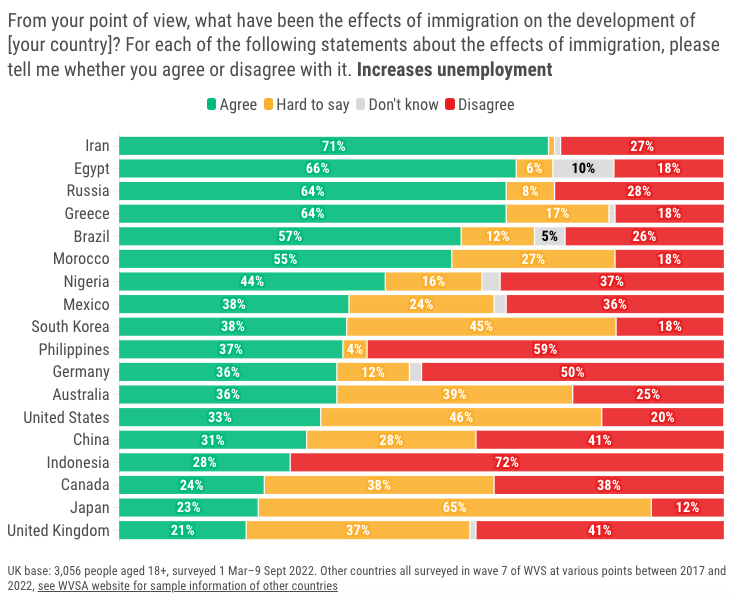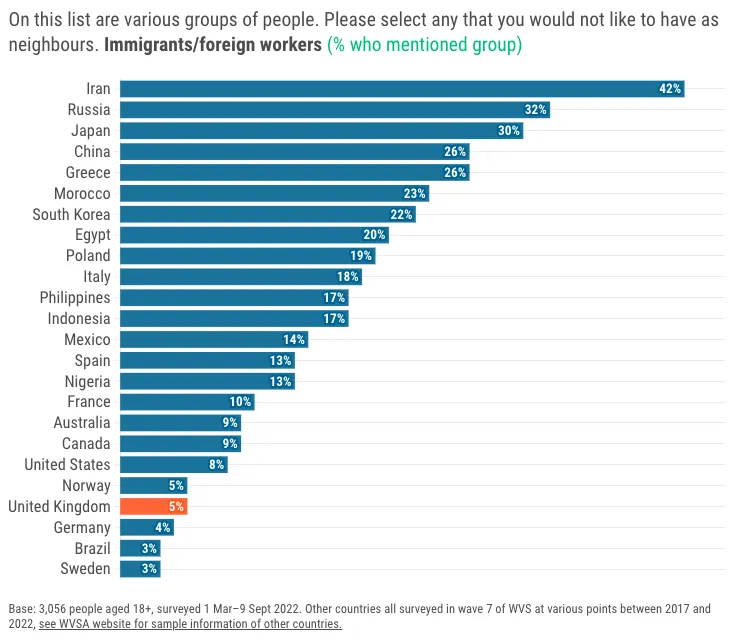23 February 2023
UK attitudes to immigration among most positive internationally
Public opinion has shifted a huge amount in a relatively short space of time

UK attitudes to immigration: how the public became more positive
Read the research
The UK public have among the most positive attitudes to immigration, according to a new study that ranks the country at the top of an international league table as the most accepting of new arrivals.
Of 17 countries, the UK is least likely to say the government should place strict limits on the number of foreigners who can come to the country or prohibit people from coming altogether. 31% of the UK public hold this view, compared with 35% of people in Germany and 39% in Canada – the next-most accepting countries on this measure.
At the same time, 68% of the UK public think we should either let anyone come to who wants to or let them come as long as there are jobs available – the highest of any nation.

The study was carried out by the Policy Institute at King’s College London for a major new research programme as part of the World Values Survey, one of the largest and most widely used academic social surveys in the world which has been running since 1981.
The new UK data was collected in 2022, with the most recent data for other nations collected at various points throughout the latest wave of the WVS, which spanned 2017 to 2022.
The findings underline just how far British attitudes to immigration have shifted in a relatively short space of time:
-
In 2009, 65% of Britons thought that when jobs are scarce, employers should give priority to people of this country over immigrants – but this has since more than halved, to 29% in 2022.
-
Today only Germany (27%) and Sweden (11%) are less likely than the UK to hold this view. Yet in 2009, the UK was more likely than 11 other nations to think the native-born population should be prioritised over immigrants when jobs are scarce

The UK’s increasing openness to immigration is clearly driven in part by positive perceptions of the impact that immigrants have on the country. Of around 20 nations, the UK ranks as having either the most, or among the most, favourable views on a range of impacts:
-
The UK (21%) is least likely to think immigration increases unemployment – far behind countries including Germany (36%) and Australia (36%) and the US (33%).
-
Only South Korea (67%) is more likely than the UK (63%) to agree that immigrants fill important job vacancies.
-
The UK (70%) is second only to Canada (73%) in believing that immigration strengthens cultural diversity.
-
The UK (22%) is least likely to say that immigration causes the crime rate to rise, with countries such as Germany (61%) and Australia (35%) far more likely to hold this view. The UK is also among the least likely to think immigration increases the risks of terrorism (28%).
-
The UK (55%) ranks fourth for the belief that immigrants have a very or quite good impact on the development of the country – ahead of other western nations such as Norway (49%), Spain (47%), the US (40%) and Sweden (39%).

However, the UK (39%) does rank more mid-table for the belief that immigration leads to social conflict – on a par with the US (41%) and ahead of Canada (33%), but far below Germany (82%), which is most likely to feel this way.
We’ve also become increasingly comfortable with immigration on a more personal level:
-
One in 20 (5%) Britons said they would not like to have immigrants or foreign workers as neighbours in 2022 – compared with one in seven (14%) in 2009.
-
The UK is now among the most accepting countries on this measure – in contrast to similar western nations such as Italy (18%), Spain (13%), France (10%) and Australia (9%), which are all more likely to have a problem with their neighbours being immigrants.
And more generally, the research finds that growing positivity about immigration isn’t solely driven by more liberal attitudes among younger people. Views among older generations have also changed hugely – for instance, in 2009, 73% of the pre-war generation born before 1945 agreed that employers should prioritise jobs for people born in this country over immigrants, but by 2022 this had fallen to 38%.

Professor Bobby Duffy, director of the Policy Institute at King’s College London, said:
“It was unthinkable a decade ago that the UK would top any international league table for positive views of immigration. But that’s where we are now, with the UK the least likely from a wide range of countries to say we should place strict limits on immigration or prohibit it entirely.
“Some of the drivers of this extraordinary shift are clear in how we see the contribution of immigrants to our economy and services – we’re now the least likely to think immigration increases unemployment, and second from top in thinking that immigrants fill important job vacancies. We’re also very likely to say immigration boosts cultural diversity, while very unlikely to think immigration comes with crime and safety risks.
“Politicians often misread public opinion on immigration. In the 2000s, Labour government rhetoric and policy on this issue was more relaxed than public preferences, and arguably they paid the price – but the current government is falling into the reverse trap. Immigration is a classic example of a ‘thermostatic’ attitude, where policymakers overshoot signals from the public – and then eventually get pulled back. It’s time to listen more carefully to public attitudes.”
Technical details
2022 UK data comes from a random probability sample of 3,056 adults aged 18+ interviewed by Ipsos through a mix on face-to-face and online survey methods. Data has been weighted by region, education and age interlocked with gender to be nationally representative.
For analysis of trends over time, data is nationally representative for Great Britain due to a lack of available trend data from Northern Ireland, and is based on surveys of 1,000 or more people aged 18+.
Samples for other countries are all nationally representative and made up of at least 1,000 people. Information on the sampling methodology these nations is available via the World Values Survey Association website.
Data produced for this research is used in wave 7 of the World Values Survey, which included around 90 countries and ran from 2017 to 2022. See the full report for the precise year each country was surveyed. The report focuses on a cross-section of 24 countries selected based on the availability of reliable and weighted data and then narrowed down, focusing on global coverage (based on the UN's standardised country coding system), regional coverage and population size. This selection gives coverage of 12 of the 17 UN M49 geographic regions across 24 countries, representing almost 50% of the world's population (source: World Bank). Not all questions are asked in each country in every wave of the study, and so the number of countries compared on each question can vary.

